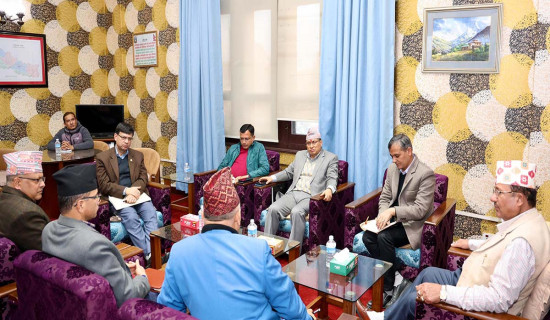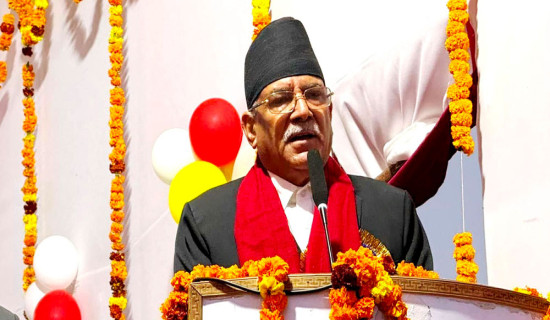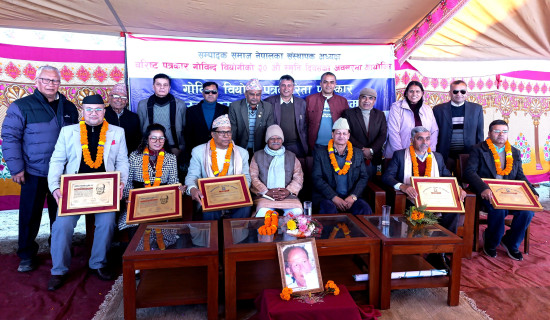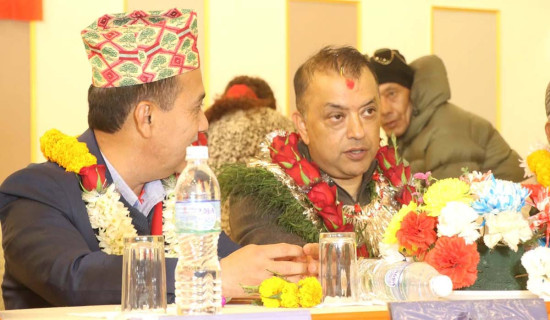- Sunday, 18 January 2026
NRB tightening credit mobilization of cooperatives
Kathmandu, Jan 14: The Nepal Rastra Bank (NRB) has unveiled a draft with new standards to manage savings and credit of cooperative organizations with the government issuing a new law relating to cooperative sector management through an ordinance.
In order to maintain transparency and balance in the fiscal activities of embattling cooperative sector, the central bank on Monday made public the draft of 'Directive and Standards issued for Cooperative Organizations having Savings and Credit Transactions'.
In the draft of the standards, cooperatives can collect savings only from their members, set savings collection limit according to the scope, tighten the loan investment and emphasize on investment in the productive sector.
The Rastra Bank has said that the draft has been brought to ensure discipline and transparency in the cooperative sector.
It has been requested to give suggestions or inputs on the draft by coming February 12.It is expected that the provision of completely prohibiting the collection of savings from non-members except the members mentioned in the draft and allowing them to collect only within a certain limit will put an end to the practice of collecting risky savings from non-members.
"A co-operative organization dealing with savings and credit can collect savings only from its members, while such an organization can collect savings up to fifteen times of the primary capital fund. Institutions can borrow up to five percent of the total assets or up to a maximum of 100 percent of the capital fund from banks and financial institutions", the draft states.
The savings collection limit of the organizations dealing savings and credit has also been fixed. A cooperative with jurisdiction in one district can collect savings up to Rs 1 million, Rs 2.5 million if there is more than one district jurisdiction and up to Rs 5 million if there is more than one jurisdiction.
According to the draft, the organization can operate ordinary and regular types of savings accounts and the members of the cooperatives must disclose the source while depositing more than Rs 1 million in savings.
Similarly, the credit flow is also going to be tightened. "Cooperatives dealing savings and credit will not be able to invest loans to the members whose membership has not exceeded three months. The organization shall not be able to lend more than 15 percent of the primary capital fund per member", the draft notes.
Also the organizations can provide loans to the members having regular savings five times their savings amount or a maximum of Rs 300,000, whichever is less. In this way, a provision is being made to take the deposit of at least two members while issuing loans without collateral and the director will not be able to take any additional loan other than the loan received in the protection of his savings.
The organization can provide loans to the regular depositors amounting to Rs 300,000 in maximum or five times of his/her savings amount without any collateral.
In this way, a provision is being made to take the deposit of at least two members while issuing loans without collateral and the director will not be able to take any additional loan other than the loan received in the protection of his savings.
According to the draft, savings and credit cooperatives can invest in shares of cooperative banks and small farmers' microfinance institutions and bonds issued by the government.
Apart from this, no investment will be allowed in the shares and debentures of any other organization. Co-operative organizations are also to be tightened in the purchase of real estate, the draft mentioned.
"Land or building equivalent to a maximum of 25 per cent of the primary capital or a maximum of 50 per cent of the reserve fund can be purchased or constructed for office purposes if it has been operating continuously for the last three years on net profit without reserved loss.
Similarly, emphasis has been laid on expanding sectoral credit. "Organizations with large businesses other than specialized institutions will have to disburse at least 50 percent of the total loan to productive sectors including agriculture, industry and business operation and expansion", reads the draft.
The savings and credit organizations will be able to provide loans up to a maximum of 90 percent to protect the savings of the members.
According to the draft, loans up to a maximum of 50 percent of the collateral value in metropolitan cities and sub-metropolitan cities and up to 60 percent in the case of collateral in municipalities and rural municipalities can be provided while issuing loans against the mortgage of immovable property.
Provisions related to loan restructuring and rescheduling of savings and credit cooperatives have also been included in the draft.(RSS)














